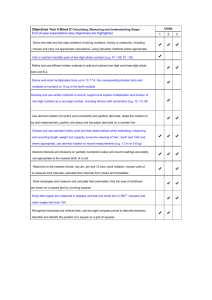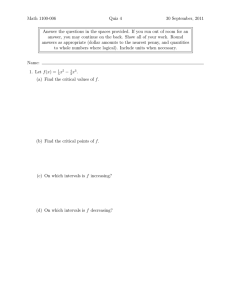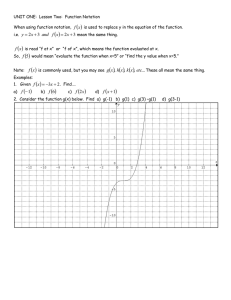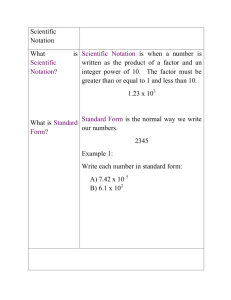Mathsworks Yearly Plans Year 4 Block D (DOC, 57 KB)
advertisement
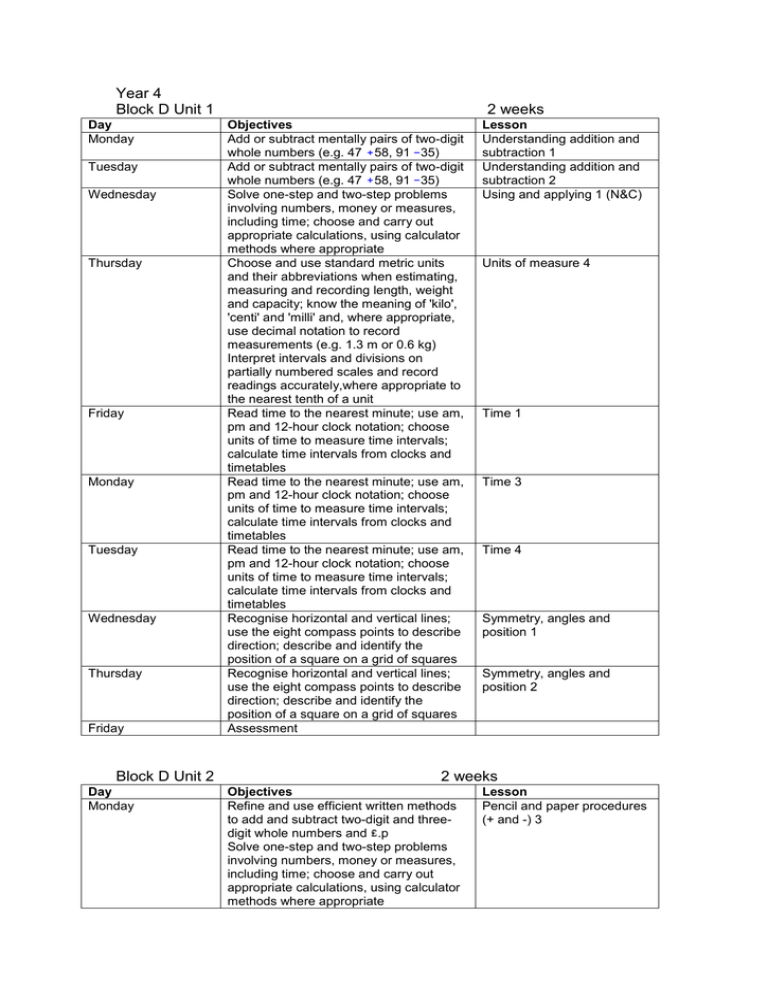
Year 4 Block D Unit 1 Day Monday Tuesday Wednesday Thursday Friday Monday Tuesday Wednesday Thursday Friday Block D Unit 2 Day Monday 2 weeks Objectives Add or subtract mentally pairs of two-digit whole numbers (e.g. 47 58, 91 35) Add or subtract mentally pairs of two-digit whole numbers (e.g. 47 58, 91 35) Solve one-step and two-step problems involving numbers, money or measures, including time; choose and carry out appropriate calculations, using calculator methods where appropriate Choose and use standard metric units and their abbreviations when estimating, measuring and recording length, weight and capacity; know the meaning of 'kilo', 'centi' and 'milli' and, where appropriate, use decimal notation to record measurements (e.g. 1.3 m or 0.6 kg) Interpret intervals and divisions on partially numbered scales and record readings accurately,where appropriate to the nearest tenth of a unit Read time to the nearest minute; use am, pm and 12-hour clock notation; choose units of time to measure time intervals; calculate time intervals from clocks and timetables Read time to the nearest minute; use am, pm and 12-hour clock notation; choose units of time to measure time intervals; calculate time intervals from clocks and timetables Read time to the nearest minute; use am, pm and 12-hour clock notation; choose units of time to measure time intervals; calculate time intervals from clocks and timetables Recognise horizontal and vertical lines; use the eight compass points to describe direction; describe and identify the position of a square on a grid of squares Recognise horizontal and vertical lines; use the eight compass points to describe direction; describe and identify the position of a square on a grid of squares Assessment Lesson Understanding addition and subtraction 1 Understanding addition and subtraction 2 Using and applying 1 (N&C) Units of measure 4 Time 1 Time 3 Time 4 Symmetry, angles and position 1 Symmetry, angles and position 2 2 weeks Objectives Refine and use efficient written methods to add and subtract two-digit and threedigit whole numbers and .p Solve one-step and two-step problems involving numbers, money or measures, including time; choose and carry out appropriate calculations, using calculator methods where appropriate Lesson Pencil and paper procedures (+ and -) 3 Tuesday Wednesday Thursday Friday Monday Tuesday Wednesday Thursday Friday Refine and use efficient written methods to add and subtract two-digit and threedigit whole numbers and .p Derive and recall multiplication facts up to 10 10, the corresponding division facts and multiples of numbers to 10 up to the tenth multiple Develop and use written methods to record, support and explain multiplication and division of two-digit numbers by a one-digit number, including division with remainders (e.g. 15 9, 98 6) Use decimal notation for tenths and hundredths and partition decimals; relate the notation to money and measurement; position one-place and two-place decimals on a number line Choose and use standard metric units and their abbreviations when estimating, measuring and recording length, weight and capacity; know the meaning of 'kilo', 'centi' and 'milli' and, where appropriate, use decimal notation to record measurements (e.g. 1.3 m or 0.6 kg) Interpret intervals and divisions on partially numbered scales and record readings accurately,where appropriate to the nearest tenth of a unit Draw rectangles and measure and calculate their perimeters; find the area of rectilinear shapes drawn on a square grid by counting squares Draw rectangles and measure and calculate their perimeters; find the area of rectilinear shapes drawn on a square grid by counting squares Recognise horizontal and vertical lines; use the eight compass points to describe direction; describe and identify the position of a square on a grid of squares Know that angles are measured in degrees and that one whole turn is 360 ; compare and order angles less than 180 Recognise horizontal and vertical lines; use the eight compass points to describe direction; describe and identify the position of a square on a grid of squares Pencil and paper procedures (+ and -) 4 Objectives Refine and use efficient written methods to add and subtract two-digit and threedigit whole numbers and .p Solve one-step and two-step problems involving numbers, money or measures, including time; choose and carry out appropriate calculations, using calculator methods where appropriate Lesson Pencil and paper procedures (+ and -) 7 Block D Unit 3 Day Monday Rapid recall of multiplication and division facts 5 Understanding multiplication and division 8 Fractions, decimals, %, ratio and proportion 11 Units of measure 5 Area and perimeter 1 Area and perimeter 2 Symmetry, angles and position 3 Symmetry, angles and position 5 2 weeks Tuesday Wednesday Thursday Friday Monday Tuesday Wednesday Thursday Friday Refine and use efficient written methods to add and subtract two-digit and threedigit whole numbers and .p Solve one-step and two-step problems involving numbers, money or measures, including time; choose and carry out appropriate calculations, using calculator methods where appropriate Use decimal notation for tenths and hundredths and partition decimals; relate the notation to money and measurement; position one-place and two-place decimals on a number line Choose and use standard metric units and their abbreviations when estimating, measuring and recording length, weight and capacity; know the meaning of 'kilo', 'centi' and 'milli' and, where appropriate, use decimal notation to record measurements (e.g. 1.3 m or 0.6 kg) Interpret intervals and divisions on partially numbered scales and record readings accurately,where appropriate to the nearest tenth of a unit Read time to the nearest minute; use am, pm and 12-hour clock notation; choose units of time to measure time intervals; calculate time intervals from clocks and timetables Read time to the nearest minute; use am, pm and 12-hour clock notation; choose units of time to measure time intervals; calculate time intervals from clocks and timetables Draw rectangles and measure and calculate their perimeters; find the area of rectilinear shapes drawn on a square grid by counting squares Draw rectangles and measure and calculate their perimeters; find the area of rectilinear shapes drawn on a square grid by counting squares Know that angles are measured in degrees and that one whole turn is 360 ; compare and order angles less than 180 Assessment Pencil and paper procedures (+ and -) 11 Fractions, decimals, %, ratio and proportion 13 Units of measure 6 Time 2 Time 5 Area and perimeter 3 Area and perimeter 5 Symmetry, angles and position 4
